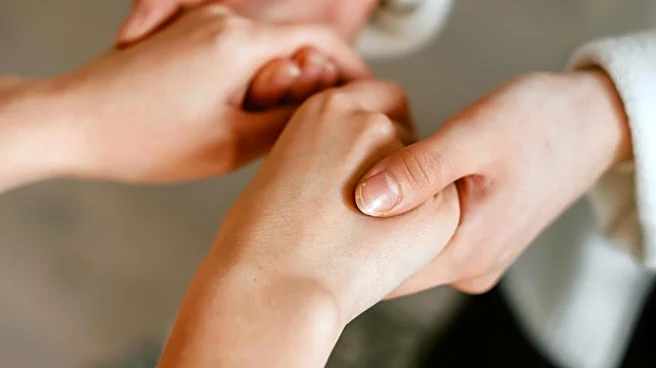What's Happening?
A concerned friend is seeking advice on how to support her best friend, who is experiencing verbal abuse from her husband. The couple has been together for over a decade, but the husband's abusive behavior
has intensified over the past year. Despite witnessing the abuse firsthand, the friend is struggling with how to help, as the husband attributes his behavior to mental health issues, and the wife believes he cannot control it. The article discusses the emotional toll on the friend and the complexities involved in supporting someone in an abusive relationship. It emphasizes the importance of maintaining boundaries while offering support and suggests focusing on the well-being of both the friend and the friendship.
Why It's Important?
This situation highlights the broader issue of domestic abuse and the challenges faced by those trying to support victims. It underscores the need for empathy and understanding, as well as the importance of maintaining a support system for those in abusive relationships. The article suggests that shaming or judging the victim can further isolate them, making it easier for the abuser to control the situation. It also points out the emotional and psychological impact on those who witness abuse, stressing the importance of self-care for supporters. The story serves as a reminder of the complexities of domestic abuse and the need for informed and compassionate support.
What's Next?
The article suggests that if the friend's safety is ever in danger, it is crucial to seek help from trained professionals and organizations dedicated to supporting victims of domestic violence. It encourages the friend to focus on what she can control, such as her own well-being and her response to the situation. The article also advises maintaining a supportive presence in the victim's life, as isolation can exacerbate the abuse. It highlights the importance of empathy and understanding, and the potential for the friend to be a source of strength and support as the victim navigates her relationship.
Beyond the Headlines
The article explores the deeper implications of staying in an abusive relationship, such as the impact of childhood experiences on decision-making and the societal pressures that may influence a victim's choices. It discusses the importance of allowing individuals the agency to make their own decisions, even if they seem counterintuitive to outsiders. The story also touches on the cultural and emotional dimensions of friendship and support, emphasizing the value of unconditional love and understanding in helping victims find their way out of abusive situations.









